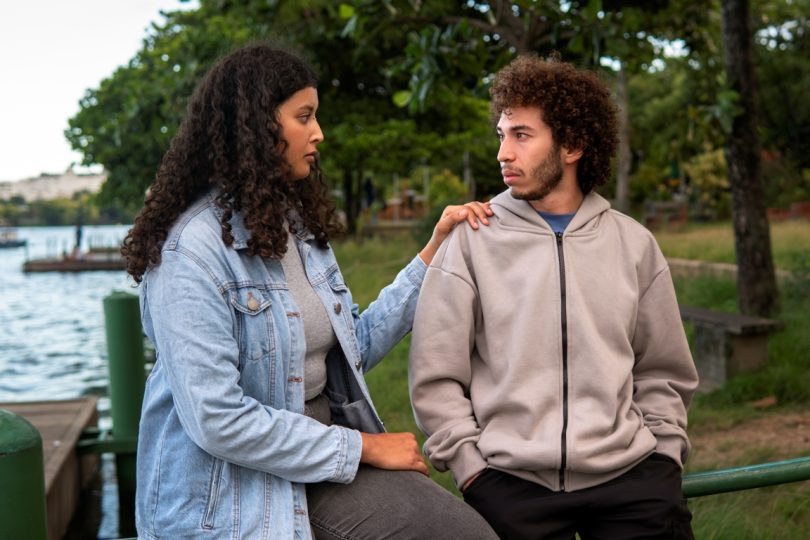In today’s fast-paced dating world, casual relationships have become increasingly common. However, despite their informality, ending a casual relationship can still be a challenging and sensitive process. Whether you’ve realized that it’s time to move on or simply want to explore other options, knowing how to end a casual relationship gracefully is essential.
Table of Contents
- Signs it’s Time to End a Casual Relationship
- How to Prepare for Ending a Casual Relationship
- How to Have the Conversation
- Dealing with Reactions and Emotions
- Setting Boundaries After Ending the Relationship
Key Takeaways
- Recognize signs indicating it’s time to end a casual relationship, such as lack of emotional connection and misaligned expectations.
- Prepare for the conversation by reflecting on your feelings, considering the other person’s emotions, and planning the discussion.
- When having the conversation, choose an appropriate time and place, be honest and direct, and allow the other person to express their feelings.
- Anticipate and manage reactions and emotions, including potential resistance, sadness, and disappointment.
- After ending the relationship, establish clear boundaries, communicate expectations, and give both parties space if needed.
Signs it’s Time to End a Casual Relationship
Ending a casual relationship can be difficult, but sometimes it’s the best decision for both parties involved. Recognizing the signs that indicate it’s time to end the relationship can help you navigate this process with clarity and confidence.
Lack of Emotional Connection
In a casual relationship, emotional connections may not be as deep or meaningful as in a serious, long-term commitment. However, if you find yourself feeling disconnected or unfulfilled, it may be a sign that the relationship has run its course. Pay attention to your emotional well-being and happiness within the relationship.
Misaligned Expectations
Miscommunication or unspoken expectations can often lead to conflict or disappointment in casual relationships. If you and your partner have different ideas about the nature or future of the relationship, it may be time to reassess whether it’s working for both of you.
Desire for Something More Serious
Aspirations and goals can change over time, and what may have started as a casual fling could evolve into a desire for a deeper, more committed relationship. If you find yourself craving more intimacy or longing for a greater connection, it’s important to honor your feelings and communicate them openly with your partner.

How to Prepare for Ending a Casual Relationship
Preparing for the end of a casual relationship involves introspection, empathy, and planning. Taking the time to reflect on your own feelings and consider the impact on the other person can help ensure a smoother transition.
Self-Reflection and Understanding Your Own Feelings
Before initiating the conversation, it’s essential to understand your own emotions and motivations. Ask yourself questions such as:
- Am I truly happy in this relationship?
- What do I need and want in a partner?
- Do I see a future with this person?
Being honest with yourself can guide your decision-making process and prepare you for the discussion ahead.
Consideration of the Other Person’s Feelings
While ending a casual relationship may be right for you, it’s important to acknowledge and respect the other person’s emotions. Put yourself in their shoes and consider how they might react to the news. Showing empathy and compassion can help soften the blow and minimize hurt feelings.
Planning the Conversation
Approaching the conversation with care and sensitivity can make the process smoother for both parties. Choose a time and place where you can talk privately and without interruptions. Consider what you want to say and how you can communicate your feelings clearly and respectfully.

How to Have the Conversation
Initiating the conversation about ending a casual relationship requires courage and openness. Approach the discussion with empathy and honesty, and be prepared for a range of emotions from both sides.
Choose the Right Time and Place
Selecting an appropriate time and location for the conversation can set the tone for the discussion. Avoid public settings or times when either party may be distracted or rushed. Opt for a private and comfortable environment where you can talk openly and without interruptions.
Be Honest and Direct
Honesty is key when ending a casual relationship. Express your feelings and reasons for wanting to end the relationship clearly and directly. Avoid sugarcoating or ambiguity, as this can lead to confusion and misunderstandings.
Allow the Other Person to Express Their Feelings
Creating a space for the other person to share their thoughts and feelings is crucial for closure and mutual understanding. Listen actively and empathetically, and validate their emotions even if you don’t agree with them. Respect their perspective and avoid interrupting or invalidating their experiences.

Dealing with Reactions and Emotions
Ending a casual relationship can evoke a range of emotions from both parties, including sadness, anger, and relief. Navigating these reactions with sensitivity and empathy is essential for maintaining respect and dignity.
Handling Potential Resistance or Denial
It’s common for the other person to react with resistance or denial when faced with the end of a relationship. Remain firm in your decision, but acknowledge their feelings and perspective. Avoid engaging in arguments or defensiveness, and reiterate your reasons for ending the relationship calmly and clearly.
Coping with Sadness or Disappointment
Both parties may experience feelings of sadness or disappointment after ending a casual relationship. Allow yourself to grieve the loss of the relationship and seek support from friends or family if needed. Engage in self-care activities and focus on healing and moving forward.
Offering Support and Understanding
Showing compassion and support to the other person during this time can help ease the transition and promote healing. Express empathy for their emotions and offer to be there for them if they need someone to talk to. Reassure them that the decision was difficult for you as well, and emphasize the importance of mutual respect and care moving forward.
Frequently Asked Questions
How do you know when to end a casual relationship?
Knowing when to end a casual relationship can be challenging, but paying attention to your emotions and needs can provide clues. Consider whether you feel fulfilled and happy in the relationship, and evaluate whether your goals and expectations align with those of your partner.
What is the best way to end a casual relationship?
The best way to end a casual relationship is with honesty, respect, and compassion. Choose a suitable time and place to have the conversation, and be clear and direct about your feelings and intentions. Listen empathetically to your partner’s response and offer support as needed.
How do you deal with hurt feelings after ending a casual relationship?
Dealing with hurt feelings after ending a casual relationship requires self-care and support from loved ones. Allow yourself to grieve the loss and engage in activities that bring you comfort and joy. Reach out to friends or family for emotional support and seek professional counseling if needed.
Is it possible to remain friends after ending a casual relationship?
Remaining friends after ending a casual relationship is possible, but it depends on the individuals involved and the circumstances of the breakup. Both parties must be willing to maintain healthy boundaries and communicate openly about their expectations for the friendship. Take time to heal and reassess whether a friendship is feasible for both parties.
How long does it take to get over a casual relationship?
The time it takes to get over a casual relationship varies for each individual and depends on factors such as the length of the relationship, emotional attachment, and personal resilience. Give yourself permission to grieve and heal at your own pace, and seek support from loved ones if needed.
What if one person wants to end the casual relationship but the other doesn’t?
Navigating asymmetrical desires in a casual relationship can be challenging, but communication and respect are essential. Honor your own feelings and boundaries, and encourage open and honest dialogue with your partner. Seek compromise and mutual understanding, but ultimately prioritize your own well-being and happiness.
Conclusion
Concluding the discussion on ending a casual relationship, it’s evident that this process requires careful consideration, empathy, and communication. Recognizing the signs indicating it’s time to end the relationship, preparing for the conversation, and navigating reactions and emotions are crucial steps in ensuring a respectful and dignified closure.
Setting boundaries after the breakup is essential for maintaining healthy space and promoting healing for both parties involved. Additionally, addressing frequently asked questions can provide further clarity and guidance for individuals navigating the end of a casual relationship.
Ultimately, while ending a casual relationship may be challenging, approaching it with honesty, respect, and compassion can lead to a smoother transition and pave the way for personal growth and healing.








Leave a Comment